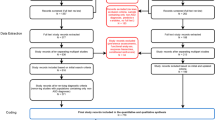Abstract
One-hundred families with young conduct problem children were randomly assigned to either an individually administered videotape modeling parent training program (IVM) or to a waiting-list control group. Results immediately posttreatment indicated that treated parents reported using significantly less physical discipline and perceived improvements in their children's behavior problems compared with untreated control parents. During home observations, treated parents exhibited significant changes in at least two of the four behavior outcome variables in their interactions with their children compared with untreated parent—child interactions. One year later, these changes were maintained and the children continued to improve. Correlational analyses indicated that, for treated families, single mother status, maternal depression, and mother's mental age were significantly correlated with at least two of the four mother outcome variables at both posttreatment assessments. A 1-year followup social class was significantly correlated with more critical mother behaviors and increased child deviance. For fathers, analyses indicated that high negative life stress and father depression was correlated with more negative father perceptions of child adjustment and increased child deviance at immediate posttreatment. At 1-year followup only father mental age was correlated with teacher perceptions of child behavior problems. The data support the general effectiveness of the IVM program but caution its use as the sole treatment with highly stressed families.
Similar content being viewed by others
References
Abidin, R. R. (1983).Parenting Stress Index — Manual. Charlottesville, VA: Pediatric Psychology Press.
Achenbach, T. M., & Edelbrock, C. S. (1983).Manual for the Child Behavior Checklist and Revised Child Behavior Profile. Burlington, VT: University Associates in Psychiatry.
Beck, A. T. (1972).Depression: Causes and treatment. Philadelphia: University of Pennsylvania Press.
Behar, L. B. (1977). The Preschool Behavior Questionnaire.Journal of Abnormal Child Psychology, 5 265–275.
Chamberlain, P., & Reid, J. B. (1987). Parent observation and report of child symptoms.Behavioral Assessment, 9 97–109.
Dumas, J. E., & Wahler, R. G. (1983). Predictors of treatment outcome in parent training: Mother insularity and socioeconomic disadvantage.Behavioral Assessment, 5 301–313.
Eyberg, S. M., & Ross, A. W. (1978). Assessment of child behavior problems: The validation of a new inventory.Journal of Clinical Psychology, 16 113–116.
Forehand, R., King, H., Reid, S., & Yoder, P. (1975). Mother-child interactions: Comparison of a noncompliant clinic group and a nonclinic group.Behaviour Research and Therapy, 13 79–84.
Griest, D. L., & Wells, K. C. (1983). Behavioral family therapy with conduct disorders in children.Behavior Therapy, 14 37–53.
Hollingshead, A. B., & Redlich, F. C. (1958).Social class and mental illness. New York: Wiley.
Jacobson, N. S., & Revenstorf, D. (1988). Statistics for assessing the clinical significance of psychotherapy techniques: Issues, problems, and new developments.Behavioral Assessment, 10 133–145.
Locke, H. S., & Wallace, K. M. (1959). Short marital adjustment and prediction tests: Their reliability and validity.Marriage and Family Living, 21 251–255.
Patterson, G. R. (1982).A social learning approach: Coercive family process. Eugene, OR: Castalia.
Rehm, L. P. (1981). Self-report depression scales. In M. Hersen & A. S. Bellack (Eds.),Behavioral assessment: A practical handbook (2nd ed., pp. 246–295). Oxford, England: Pergamon Press.
Robinson, E. A., & Eyberg, S. M. (1981). The dyadic parent-child interaction coding system: Standardization and validation.Journal of Consulting and Clinical Psychology, 49 245–250.
Robinson, E. A., Eyberg, S. M., & Ross, A. W. (1980). The standardization of an inventory of child conduct problem behaviors.Journal of Clinical Child Psychology, 9 22–28.
Sarason, I., Johnson, H., & Seigel, M. (1978). Assessing the impact of life changes: Development of the life experiences survey.Journal of Consulting and Clinical Psychology, 49 2, 932–946.
Shipley, W. C. (1940). A self-administering scale for measuring intellectual impairment and deterioration.Journal of Psychology, 9 371–377.
Webster-Stratton, C. (1985a). Predictors of treatment outcome in parent training for conduct disordered children.Behavior Therapy, 16 223–243.
Webster-Stratton, C. (1985b). Mother perceptions and mother-child interactions: Comparison of a clinic-referred and a nonclinic group.Journal of Clinical Child Psychology, 14 334–339.
Webster-Stratton, C., Kolpacoff, M., & Hollinsworth, T. (1988). Self-administered videotape therapy for families with conduct-problem children: Comparison with two cost-effective treatments and a control group.Journal of Consulting and Clinical Psychology, 56 558–566.
Author information
Authors and Affiliations
Additional information
This research was supported by the NIH Institute of Nursing grant 2 R01 NR01075-05. Special appreciation goes to Christine Howard for her careful preparation of the manuscript.
Rights and permissions
About this article
Cite this article
Webster-Stratton, C. Individually administered videotape parent training: “who benefits?”. Cogn Ther Res 16, 31–52 (1992). https://doi.org/10.1007/BF01172955
Issue Date:
DOI: https://doi.org/10.1007/BF01172955




